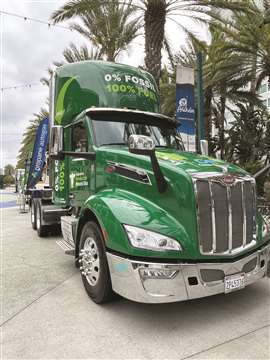Street Smarts: Why the 2027 Class 8 prebuy is dead on arrival
21 July 2025
Everyone is eyeing Donald Trump, but a variety of factors killed off the 2027 Class 8 prebuy before it even began.
Truck prebuys are a fairly new phenomenon in the North American trucking industry. But they have become a relatively common occurrence over the past 20 years.
A truck prebuy is when fleets buy new trucks ahead of price increases and technology additions – usually mandated by EPA emissions regulations.
And for the past three or four years, the common thinking in the trucking industry has been that the largest Class 8 prebuy in history would spark off sometime this year. That’s because of the EPA’s 2027 Clean Truck Rules, which were set to become law in January 2027.
Failure to Materialize
2027 marked the toughest emissions regulations ever mandated for heavy-duty diesel engines. The conventional thinking was the new technology on new trucks, combined with warranty extensions designed to extend the life of exhaust aftertreatment systems out to 400,000 miles, would drive new truck costs up by as much as $20,000 to $25,000 per unit.
Looking at those numbers, it seemed safe to assume fleets would purchase large numbers of new trucks ahead of 2027. But that assumption was based on the expectation that the freight market, sluggish since the 2020 COVID-19 pandemic, would have rebounded by now, giving fleets the capital necessary to fund large purchases of new trucks.
Kenny Vieth, president and chief analyst at ACT Research, was one of many voices predicting a massive 2027.
But now, he said many of the factors he was counting on to fuel that prebuy simply never materialized. And that was before Donald Trump won a second term as President of the United States and began an aggressive campaign to roll back diesel exhaust emissions regulations.
“In 2022, we were optimistic that the freight market would be driving strong carrier profitability by now,” Vieth said. “Typically, freight market downturns last six to eight quarters. But this freight downturn is now in its 13th quarter. So, our expectation that carrier profitability would be peaking about now has absolutely not come true.”
Trade War Impacts
Trump’s trade wars have not helped matters, Vieth continued.
 With so many questions surrounding 2027 regulations, the anticipated prebuy of new vehicles appears unlikely to happen. (Photo: Becky Schultz)
With so many questions surrounding 2027 regulations, the anticipated prebuy of new vehicles appears unlikely to happen. (Photo: Becky Schultz)
“The first half of 2025 has been marked by uncertainty amid the pulling forward of consumer demand and business inventories,” he said. “I think the other shoe from these tariffs will drop in the second half of this year.”
As of June, Americans are still largely buying pre-tariff goods in stores, Vieth noted. But that will change soon.
“Soon, store shelves will be restocked with goods that reflect higher prices up and down the supply chain,” he said. “We are hearing that truck and trailer OEMs are raising prices. So too are aftermarket parts suppliers. Everything is becoming more expensive. And higher prices, combined with economic uncertainty in a profit-constrained market lowers demand.”
Looking at the economic landscape in the middle of 2025, Vieth said it is hard to suggest there will be material improvement in fleets’ abilities to improve profitability in the next couple of quarters.
Then there is the massive uncertainty regarding the unprecedented emissions regulation rollback undertaken by the Trump administration.
“The industry made huge investments in new technology to deliver lower NOx emissions,” Vieth said. “If you make a major investment like that, you hope to get a return on it. You have to think that OEMs would like to see at least the technology part of the regulations continue in 2027.”
What’s Next?
 Jack Roberts is a Tuscaloosa, Ala.-based independent journalist and licensed commercial driver with more than 20 years’ experience covering the North American and global trucking industries.
Jack Roberts is a Tuscaloosa, Ala.-based independent journalist and licensed commercial driver with more than 20 years’ experience covering the North American and global trucking industries.
So, the big question at the moment, Vieth said, is what will EPA do now in the face of the Trump emissions rollbacks?
“Will they keep the new technology on the truck but get rid of the warranty extensions?” he mused. “Will they keep everything? Or will they shelve everything? These are important questions that need to be answered quickly so that the trucking industry can decide on a path forward.”
At the end of the day, Vieth said uncertainty on virtually every front conspired to kill off the 2027 prebuy before it even began.
“I don’t think any fleets are looking to prebuy trucks right now,” he stated. “All other issues aside, why would you prebuy a new truck if you think the regulations are going to go away?”
POWER SOURCING GUIDE
The trusted reference and buyer’s guide for 83 years
The original “desktop search engine,” guiding nearly 10,000 users in more than 90 countries it is the primary reference for specifications and details on all the components that go into engine systems.
Visit Now
STAY CONNECTED




Receive the information you need when you need it through our world-leading magazines, newsletters and daily briefings.
CONNECT WITH THE TEAM













